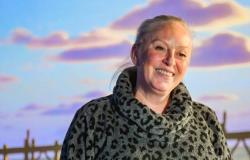Because it doesn’t always have to be a stuffy concert hall with plush seats and carpet, pianist Noah Vanden Abeele will play tomorrow evening in the auditorium of the Uitzicht crematorium in Kortrijk. “Exciting, such a special location full of emotions,” he says.
Vanden Abeele is classically trained, but has made improvisation the core of his music. Of Universe (2018) and Horizon (2022) he released two albums full of sparse piano songs, which also feature strings and analogue synths. And then Nils Frahm’s name is soon mentioned in reviews. With his combination of piano and electro, he has reached a wide audience in recent years, just like fellow pianists Ólafur Arnalds, Joep Beving, Max Richter, Ludovico Einaudi and Hania Rani.
The genre is conveniently called neoclassical and until recently it was synonymous with full concert halls and a surprising number of listens on streaming services such as Spotify.
“But I have the impression that the genre is gradually past its peak,” says Vanden Abeele.
It is thanks to Nils Frahm that Vanden Abeele plays in the crematorium of Kortrijk. It was he who introduced Piano Day in 2015, which has since been celebrated on every 88th day of the year – a piano has 88 keys – with concerts around the world.
But does Vanden Abeele have a point and is indeed gradually becoming neoclassical over the hill?
“It has become much of the same and if you limit yourself to what happens on the piano, that is certainly the case,” says Laurent Pitsi. “There is definitely a saturation point and that has caused me to drop out a bit.”
Pitsi works as a dance and concerts programmer at the Hasselt cultural center (CCHA) and was one of the first in our country to organize neoclassical concerts. First under the banner Piano Anders and since 2017 also on Piano Day. In 2011, on the same evening, he managed to meet Nils Frahm, Dustin O’Halloran and Hauschka – who last year won the Oscar for Best Film Music for his soundtrack. All quiet on the Western Front – to snare.
“Something that is no longer possible,” Pitsi laughs. The artists mentioned have become too big for that and the genre is undeniably suffering from anemia. “In recent years, only Hania Rani has managed to reach a larger audience,” says Pitsi. “The more adventurous things in the genre now usually happen away from the piano, with strings and electronics. But in general it has become too much of a formula, with a number of large ‘brands’ and among them many smaller artists that few people know.”
As usual, Pitsi programmed three pianists for Piano Day: the Belgian David Poltrock, the Estonian Hanakiv and the German Carlos Cipa. Still a high-quality line-up, although Pitsi notices that the audience’s attention is also gradually decreasing. “It is no longer so easy to sell out this evening,” he says. “It is no longer the rush of a few years ago.”
The range has not become smaller either: the piano is being celebrated this week in Amuz Antwerp, 30CC in Leuven, the Brussels Flagey and in Vilvoorde, Steenokkerzeel and Wemmel, among others. “On and around Piano Day we are fishing in the same pond with more and more players,” says Pitsi. “It remains a nice peg to hang a concert evening on, but how long can I keep it exciting for the audience and for myself?”
Babbling brook
Jan Swerts has not found neoclassical piano music exciting for some time now. “The tidal wave has become a babbling brook,” he says.
The teacher at UC Leuven-Limburg (UCLL) is a pianist himself, released four albums that were repeatedly labeled ‘neoclassical’ and interviewed several fellow pianists for the book in 2020. The new silence.
For example, he spoke with Ólafur Arnalds, when he came to perform at the Royal Circus in Brussels. The Icelander liked to label neoclassicalism as an anarchist movement, “opposed to the scorching pace of contemporary society”. Almost every evening he saw people crying in the hall. As if his music freed them from gloomy, heavy feelings and the stillness, the delay in the concert hall had a purifying effect.
“Back then, ‘neoclassical’ or ‘minimalism’ was still a buzzword,” Swerts says now. “The hype has really died down now. But all of cultural history works that way, often in connection with social trends. At the end of the nineteenth century you had the tranquil music of Debussy, Ravel and Satie, in a world that was becoming increasingly industrialized and increasingly hectic and noisy. In the 1960s, the New Age emerged with Philip Glass and Steve Reich, among others, with Brian Eno in their wake: we had to go back to the cosmos and find peace through mind-expanding substances and contemplative music.
“After that, the genre was laughed at for a long time: it was muzak, flirting with wallpaper music. Until the early 2000s when there was a new revival of minimalism, pushed forward by new media such as MySpace and YouTube, which allowed people without a network in the cultural sector to send their music out into the world. That third wave is now gradually over, I have the feeling. Also due to corona, I think: after the successive lockdowns, many people needed music with a pulse and an almost euphoric feeling of victory, not more reflection or melancholy.”
Antidote
Not diminished is the success of playlists such as Peaceful Piano (Spotify) and Piano Chill (Apple Music). They still attract millions of listeners every week, although most of the listeners usually have no idea who they are listening to. In these fast-paced, busy, noisier times, the slow, short, pop-style piano songs on these lists serve as an antidote to the world outside. They cut out all the noise while studying or cooking and don’t require too much effort from the listener.
But the phenomenon of ‘ghost pianists’ is also well known: pianists who score well on the lists, but cannot be identified as real people. These are often pseudonyms of trained pianists who want to remain anonymous and make quick money through the tunes on the playlists.
“I often hear music that I cannot define or assign to a specific composer,” says Noah Vanden Abeele. “It all has little individuality. Some pianists have hundreds of thousands of streams, but when they give a concert, hardly any people show up because no one knows who they are. That is the perverse thing now, that as a pianist you have to actively separate yourself from what you hear on the playlists.”
At the same time, there is the rise of AI, which raises the question of whether all piano songs on the playlists are still made by humans.
“Because of the excess on Spotify, and because the music is often faceless and identityless, you no longer feel its individuality, let alone the struggle of a person,” says Jan Swerts. “Indeed, it sometimes almost sounds as if a computer is at work. We have to be honest: minimalist piano music is super easy to make. Maybe I’m breaking my own windows now, but I fear it will be the first genre that AI will soon take over. Just make some piano tunes? AI can do that in no time. You don’t need much technology for it and with today’s keyboards you don’t need great software to make it sound good.
“That is the disadvantage of this movement: there is an awful lot of hot air in there. Always according to the same recipe that is applied endlessly: a 3/4 time system, a waltz, all incredibly frivolous. But I don’t know any genre that hasn’t experienced this evolution. First, a few pioneers emerge, who create something that is at odds with the prevailing trend. Then you get a series of epigones, which erodes your genre, and eventually it dies out. Until a revival takes place twenty or thirty years later.”
New Generation
But that’s not the point yet. What will happen next for the genre and what will we remember from this ‘third minimalist wave’? “I’ll give it a few more years and then hopefully a new generation will emerge,” says Laurent Pitsi. “I now notice that young musicians are starting to go back to the post-rock bands of the early and mid-nineties. Just wait a little longer and they will go back to the music of 2010, because the rediscoveries are happening more and more quickly. Then it can become interesting again.”
Jan Swerts: “We can laugh about it now, but some pianists have emerged from this movement who will be able to defy eternity. People will still be listening to Jóhann Jóhannsson’s records in a hundred years, I think. You can’t just let it ripple in the background, there’s too much going on there. His impact on the music of film composers such as Hans Zimmer is often underestimated. Just listen to the iconic organ part of Interstellar.”
And Noah Vanden Abeele? That too remains hopeful. “I know what I have to say and I will always continue to make music from this authenticity,” he says. “As an artist you have to remain original, regardless of all the hype. Otherwise it won’t last.”
Noah Vanden Abeele: Thursday evening at 8 pm in the Uitzicht crematorium in Kortrijk. Tickets via Wilde Westen Kortrijk. Piano Day in Hasselt: ccha.be.
Piano pioneers: a who’s who of the contemporary neoclassical scene
The trendsetter: Nils Frahm
The German who created Piano Day in 2015. He is known for mixing classical and electronic music, and although the piano is his main instrument, he sometimes dares to use other, more experimental instruments on stage. Toilet brushes, for example.
The streaming king: Ludovico Einaudi
Italian pianist-composer and grandson of former President Luigi Einaudi. He is a reluctant minimalist, and an acclaimed film and TV composer – he wrote the music for, among others Intouchables, The stretch and more recently Nomadland and The Father. With 9.4 million monthly listeners on Spotify, he is a real streaming fan. (To give you an idea, Angèle has 5.2 million monthly listeners on Spotify.)
The newest face: Hania Rani
Hanna Raniszewska, as Hania Rani is really called, is a 33-year-old pianist, composer and singer from Poland. After studying at the famous Frédéric Chopin University of Music in Warsaw, she moved to Berlin, following her great example Nils Frahm. Debuted in 2019 with Esja and subsequently released four more albums of her own, on which she does interesting things with classical, jazz and even house.
The most famous name in the Benelux: Joep Beving
A few years ago, this forty-something from Amsterdam still worked in the advertising sector and made music in his kitchen at night. Until he put his songs on Spotify, they were picked up by the immensely popular playlist Peaceful Piano and his streams suddenly numbered in the millions. This resulted in a recording contract with Deutsche Grammophon – the world-famous classical label that also houses Max Richter and Jóhann Jóhannsson.






